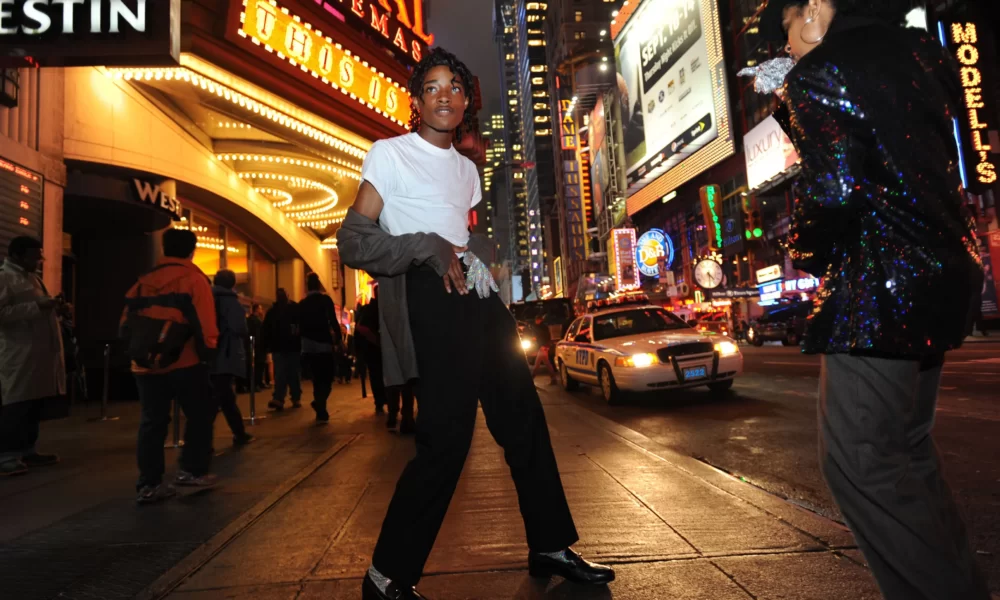Remember the lyrics to “Empire State of Mind?” How Jay Z raps, “Street lights, big dreams, all lookin’ pretty.”
30-year-old Jordan Neely, a talented former Michael Jackson impersonator who used to be found — in full MJ regalia — moonwalking on the subway and in Times Square, surely had big dreams too.

Once again, New York City has become the setting for a tragic story that exposes the deep-seated issues of racism and inequality prevalent in America. Neely’s killing, which occurred in Times Square, is a result of the intersection of white supremacy, mental illness, homelessness, and long-standing anti-Black racism in the United States. On May 1, a white man choked Neely, a performer in Times Square, on the F train, causing his death. Despite the existence of footage of the incident, bystanders chose to film instead of intervening. On May 3, the New York City coroner declared Neely’s death a homicide, but the perpetrator had not yet been identified. The police questioned and released him, emphasizing his status as an ex-Marine to the press. On May 5, the perpetrator, Daniel J. Penny, was identified, and his lawyers claimed that Penny acted in self-defense, stating that Neely had aggressively threatened Penny and other passengers. Neely’s “offense” was throwing his jacket on the ground and asking for food and water while displaying aggressive speech. The NYPD and press have been celebrating Penny as a hero, despite his fatal actions towards an unarmed and hungry individual.

All Neely Had to Do Was Be Black
Passenger Juan Alberto Vazquez recounted to the New York Times that Neely boarded the train and started shouting about being hungry and thirsty. Vazquez, who works as a freelance journalist, was afraid of what Neely might do. Vazquez’s comments bring to mind a 2017 study published by the American Psychological Association, which found that people perceive Black men as larger and stronger than white men, even when they are the same size. The study also revealed that people tend to view Black men as more capable of causing harm, and that police are more likely to use force against them, even when they are unarmed. In this case, the police made sure to inform the press of Neely’s criminal record, which included 44 prior arrests for assault, disorderly conduct, and fare evasion. Penny’s lawyers also played into the stereotype of Black men being dangerous by stating that Neely had a history of violent and erratic behavior due to untreated mental illness. Despite no one on the train knowing this information, Penny attempted to restrain Neely after he threw his jacket on the floor and continued to yell.
Framing the Narrative
It seems that Neely was involved in an altercation with a white man on the subway, and despite the man’s attempt to intervene, Neely was choked to death and pronounced dead at the scene. There is confusion over how to view the actions of the white man, who was trying to help, but ultimately caused Neely’s death. The statement from the white man’s lawyers claims that he did not intend to harm Neely and could not have predicted his death. The media has been portraying the incident as a dangerous black man being stopped by a helpful white man, with one news outlet even framing the headline in a way that seems to minimize Neely’s death. The situation raises the question of whether good intentions can lead to unintended harm.

Traumatized and Unprotected
It is evident from Neely’s background that he faced a lot of trauma and lacked protection throughout his life. At the age of 14, his mother was murdered by her abusive boyfriend who strangled her, put her body in a suitcase, and abandoned it on the Henry Hudson Parkway. When Neely was 18, he testified in court during the trial of his mother’s murderer. Despite this traumatic experience, Neely’s passion for performing as a Michael Jackson impersonator was a testament to his resilience and creativity. According to a neighbor of his father, Neely used dancing and impersonating Michael Jackson as a way of coping with his mental health issues. Neely’s father, Andre Zachary, revealed that he introduced his son to Michael Jackson’s music and moves, and Neely mastered the impersonation skillfully. Unfortunately, Zachary had not seen his son for four years. Neely was not violent, but more of an anxious and private person who preferred to be left alone.

Being Mentally Ill and Homeless Isn’t a Crime
The Pew Research Center reports that a significant percentage of young adults and middle-aged individuals have experienced high psychological distress since March 2020, much like Neely, whose mental health has deteriorated due to the pandemic. Unfortunately, even if Neely wanted mental health assistance, the United States lacks an affordable, quality healthcare infrastructure to provide it. It is also not uncommon for Black people to be homeless, as they account for a disproportionate 40% of the homeless population, despite representing only 13% of the general population, due to centuries of systemic racism that perpetuates poverty and instability, particularly for those dealing with mental health issues. Furthermore, Neely’s arrest record is not unusual for Black homeless individuals, as they are often subjected to high fines and fees for minor traffic violations or incarcerated for living outdoors, a consequence of laws that disproportionately target Black Americans.

Another Name to Hashtag
Given the vigilante-style actions of Neely’s killer, this incident is a heartbreaking reminder of what happened to Trayvon Martin — how George Zimmerman took the law into his own hands and killed a 17-year-old who merely wanted to get home safely with his Skittles and Arizona Iced Tea.
It’s also a reminder of other Black men who have been choked to death for the flimsiest of excuses.
Black lives do not matter to a nation sick to its core with racism.
The tragic killing of Eric Garner in 2014, whose dying words were “I can’t breathe” as a police officer choked him for selling loose cigarettes, is still remembered. Similarly, the devastating murder of George Floyd in May 2020, who cried out for his mother as a police officer knelt on his neck for over nine minutes, because they suspected him of using a counterfeit bill, continues to impact us. Now, with the recent killing of Jordan Neely, we are forced to confront yet another painful reminder that despite efforts to claim otherwise, Black lives are not valued in a country plagued by deep-seated racism. However, we must acknowledge that Black lives matter to us personally. We see ourselves and our loved ones in Neely’s situation and experiences, and we demand justice for him and for all Black lives.











No Comment! Be the first one.